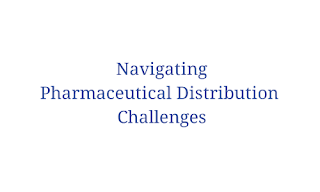The pharmaceutical industry plays a critical role in global healthcare, ensuring that life-saving medications and vaccines reach patients when they need them most. However, the journey from manufacturing facilities to the end-users is not without its challenges. Let's delve into some key challenges from a supply chain perspective:
𝗖𝗼𝗹𝗱 𝗖𝗵𝗮𝗶𝗻 𝗠𝗮𝗻𝗮𝗴𝗲𝗺𝗲𝗻𝘁: Maintaining the cold chain from production to delivery is crucial to ensure product efficacy and patient safety.
𝗚𝗹𝗼𝗯𝗮𝗹 𝗟𝗼𝗴𝗶𝘀𝘁𝗶𝗰𝘀: The pharmaceutical supply chain is truly global, making it vulnerable to geopolitical issues, trade restrictions, and natural disasters. Navigating these complexities requires agility and robust contingency planning.
𝗥𝗲𝗴𝘂𝗹𝗮𝘁𝗼𝗿𝘆 𝗖𝗼𝗺𝗽𝗹𝗶𝗮𝗻𝗰𝗲: Stringent regulations govern the pharmaceutical industry. Meeting compliance standards in multiple countries can be a daunting task, often requiring significant documentation and quality control measures.
𝗗𝗲𝗺𝗮𝗻𝗱 𝗙𝗼𝗿𝗲𝗰𝗮𝘀𝘁𝗶𝗻𝗴: Accurate demand forecasting is essential to prevent overstocking or understocking of medications. The dynamic nature of the industry and unexpected events like pandemics can disrupt these forecasts.
𝗧𝗲𝗰𝗵𝗻𝗼𝗹𝗼𝗴𝘆 𝗜𝗻𝘁𝗲𝗴𝗿𝗮𝘁𝗶𝗼𝗻: Embracing digital technologies such as blockchain, IoT, and AI can enhance supply chain visibility and traceability. However, implementing and integrating these technologies can be a challenge in itself.
𝗖𝗼𝗹𝗹𝗮𝗯𝗼𝗿𝗮𝘁𝗶𝗼𝗻: Collaboration across the entire supply chain, from manufacturers to distributors, pharmacists, and healthcare providers, is critical. Communication gaps can lead to delays and inefficiencies.
𝗖𝘆𝗯𝗲𝗿𝘀𝗲𝗰𝘂𝗿𝗶𝘁𝘆: The pharmaceutical supply chain is a prime target for cyberattacks, which can disrupt operations, steal sensitive data, or counterfeit medications.
𝗣𝗼𝗹𝗶𝘁𝗶𝗰𝗮𝗹 𝗜𝗻𝘀𝘁𝗮𝗯𝗶𝗹𝗶𝘁𝘆: Political turmoil in certain regions can hinder the import and export of pharmaceutical products, creating additional obstacles.
𝗗𝗼𝗰𝘂𝗺𝗲𝗻𝘁𝗮𝘁𝗶𝗼𝗻 𝗮𝗻𝗱 𝗦𝗲𝗿𝗶𝗮𝗹𝗶𝘇𝗮𝘁𝗶𝗼𝗻: Proper documentation and serialization of pharmaceutical products are essential for tracking and tracing, but they can be labor-intensive and prone to errors.
𝗦𝘂𝘀𝘁𝗮𝗶𝗻𝗮𝗯𝗶𝗹𝗶𝘁𝘆: As environmental concerns grow, pharmaceutical companies are under pressure to develop sustainable supply chain practices, including reducing waste and carbon emissions.
Collaboration, innovation, and a commitment to patient well-being lie at the core of finding solutions to these complex issues.
Read also: Vendor Risk Assessment in Pharmaceutical Industry


Post a Comment